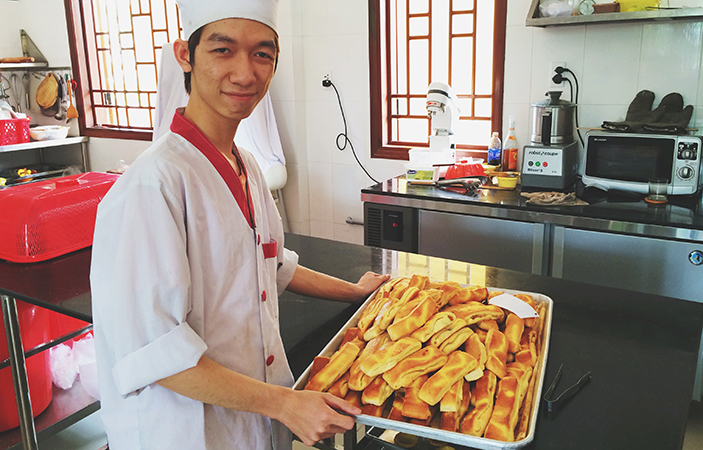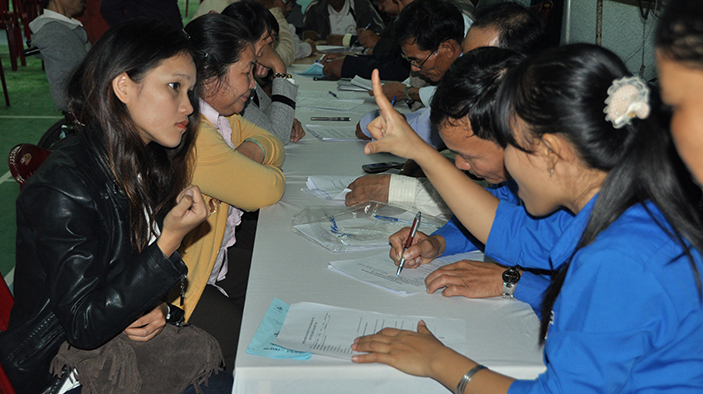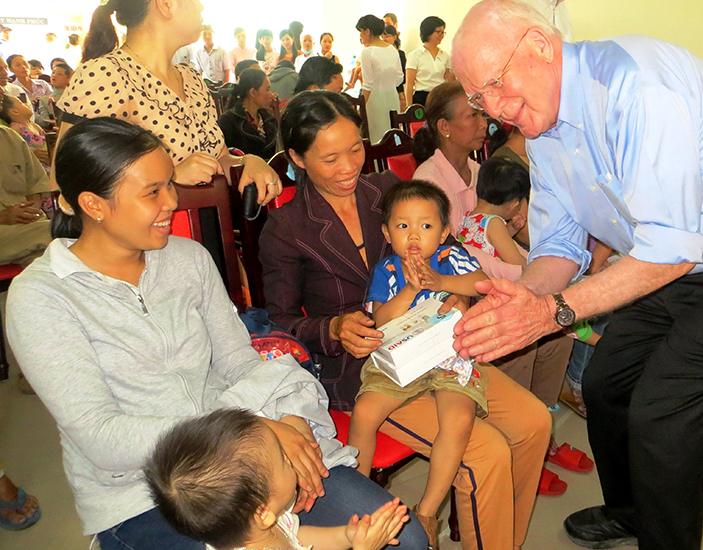DEVELOPMENTS
Energizing the Support Network for People with Disabilities in Vietnam
Mar 31, 2016
As in most countries, people with disabilities in Vietnam lead disadvantaged lives. Their plight has been exacerbated by the facts that until recently Vietnam was a very poor country without strong government social services, and the wars from the 1940s through the 1970s left many victims, adding substantially to the disability burden. The legacy of what the Vietnamese call the American War includes large numbers of unexploded ordnance and dioxin contamination where Agent Orange was sprayed or spilled that continue to affect lives and relations between the two countries today. There are an estimated 12 million people and families in Vietnam affected by disabilities.
The government of Vietnam considered disabilities as a major need, but simply did not have the resources to do much to help the disabled. Twenty-five years ago, when the U.S. Agency for International Development (USAID) first started providing some assistance through nongovernmental organizations, many war veterans did not have access to the most basic services and products such as prosthetic devices and wheelchairs. This became an early focus of U.S. assistance, thanks to the programs supported through the Leahy War Victims Fund.
Since that time many positive changes have occurred, changes I could see since I first worked in Vietnam 15 years ago as the Deputy Program Manager overseeing disabilities of the small new USAID Mission. With USAID’s assistance, Vietnam’s disability program has evolved from basic services like prosthetics and orthotics to include policy initiatives (a national disability policy modeled on the Americans With Disabilities Act) and support for a broader range of services including physical therapy, occupational therapy, speech therapy, and development of the social work profession.

Still, there were many remaining challenges when our project—the USAID Persons with Disabilities Support Program (PDSP)—began in October 2012. While Vietnam developed a strong national disability policy, its implementation and enforcement at the province and lower levels has been weak. The government has tended to treat people with disabilities as charity cases rather than individuals whose potential and capacity could be developed. Demand from people with disabilities in Vietnam has also been low. They tend to be among the poorest and least educated in the society, and therefore are not very well organized. Families tend to be embarrassed by children with disabilities and keep them home. Many do not know that every child has a right to get an education.
Addressing these challenges, working with local government, school, and health professionals, and with businesses and families, PDSP energized Vietnam’s support network for the disabled. Among the accomplishments of the 40-month program, PDSP reached more than 12,600 persons with disabilities, including:
- 3,875 examined in clinics to identify their needs.
- 2,074 who obtained wheelchairs, prosthetics, orthotics, hearing aids, and walking canes.
- 1,193 treated through corrective surgeries and physical and speech therapy.
- 1,596 children with special needs who received education assistance, including enrollment help, tuition, school supplies, and special equipment.
- 1,900 people who obtained vocational training, livelihood assistance including microloans and business training, and housing improvements.
- 2,026 people who participated in social events and leadership and advocacy training.

##Energizing the Support Network##
Working in eight of Vietnam’s 58 provinces, these results were realized with collaboration by many people, including nearly 100 PDSP partners and grantees. Teams of social workers expanded and adopted better case management systems; in turn, they more effectively tracked clients and informed them of their rights and resources. Teachers, administrators, and parents drove the expansion and effectiveness of special and inclusive education. Businesspeople opened their doors to training and employing the disabled. Public health institutions developed new curricula, becoming more dedicated to preventing and reducing the severity of disabilities.
In total, more than 4,700 health providers, educators, employers and social workers were trained by the project to adequately address the needs of persons with disabilities in their communities.
As a result of our project and other recent efforts, stigmatization of the disabled by their families has been broken down to some extent. Schools and the overall education system are embracing inclusive education, mainstreaming disabled children into regular schools. We helped by training teachers, including bachelor’s degree-level training in special education for nearly 100 teachers, and equipping inclusive education resource rooms with special materials and teaching aids for disabled kids.
People with disabilities have been helped to organize themselves and advocate for more and better services. We provided grants to disabled people’s organizations in eight provinces to strengthen the voice of their members as disability advocates.
And we piloted a case management system that bridged the health, education, and social services sectors, and trained social workers to more effectively assess the needs of disabled people and refer them for needed services. Social work and case management are new disciplines in Vietnam, but are rapidly gaining recognition, supported by a national level policy to nurture the profession, establish teaching and training programs for social workers, and mobilize social workers at the community level and in specialized settings such as hospitals.

##The Sustainability Challenge##
The accomplishments of PDSP would not have been possible without the partnership and hard work of our government partners—the Department of Labor, Invalids and Social Affairs (DOLISA); Department of Education and Training (DOET); and Department of Health (DOH)—as well as our many nongovernment partners and dedicated project team.
The 2015 evaluation of USAID’s disability programming over the past 10 years (conducted by the Vietnam Evaluation, Monitoring and Survey Services project) identified one overall key challenge: “Availability of adequate human and financial resources from the [government of Vietnam] for implementation is the key issue for sustainability across all sectors.” Specific challenges noted by the evaluation team included uncertainty about the continuation of case management and of many direct health and medical services funded through PDSP, such as corrective surgeries, without stronger local government support. We agreed with the evaluation that stronger local support for staff, training, systems development, and expansion is needed. But the PDSP team was optimistic.
Case management now has clear national government policy guidance, and the Danang local government has already issued its own policies on case management and is building support for it in its new Disability Action Plan for 2016–2020. This includes support for the network of three case managers at the commune level (from DOLISA, DOET, and DOH) established by PDSP, as well as funding for 1,680 new cases per year. Danang and other provinces are also in the process of implementing a new government policy to support the deployment of social workers at the community level.
Our team believes that while further adaptation and simplification may be needed, the “Danang model” that PDSP developed in close collaboration with our partners DOLISA, DOET, and DOH, is bringing major improvements to the services available to people with disabilities. We are hopeful that, going forward, this important PDSP legacy will find support for continuation not only in Danang but in other provinces and at the national level, and be seen as an important and successful investment by USAID.